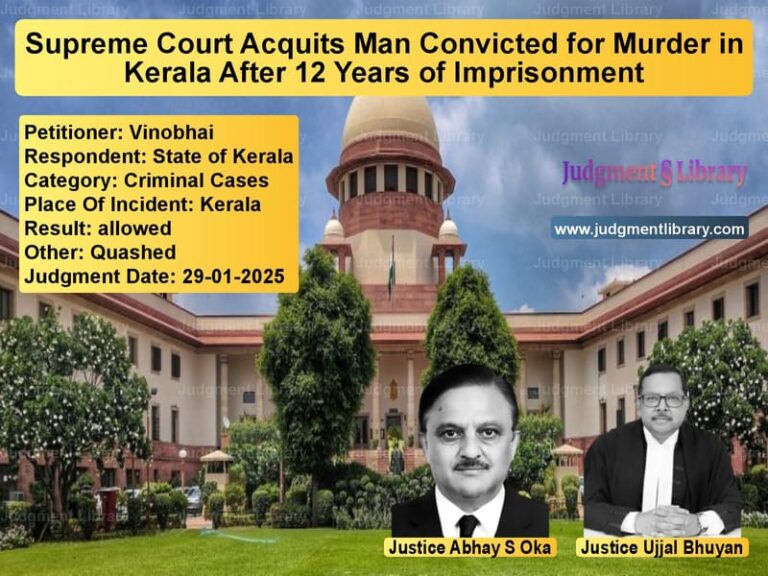Motor Vehicle Inspector Recruitment and Rule Validity: Supreme Court’s Verdict in Maharashtra Selection Dispute
The Supreme Court of India, in a landmark judgment, settled a dispute concerning the recruitment of Assistant Motor Vehicle Inspectors (AMVI) in Maharashtra. The case, Vishal Ashok Thorat & Ors. v. Rajesh Shrirambapu Fate & Ors., challenged the recruitment rules, advertisements, and selection process, raising key issues regarding employment eligibility, qualifications, and state authority in rule-making.
Background of the Case
The case arose from the Maharashtra government’s recruitment process for Assistant Motor Vehicle Inspectors under the Assistant Inspector of Motor Vehicles, Group-C in Motor Vehicles Department (Recruitment) Rules, 2016 (hereinafter referred to as “Rules, 2016”).
The Maharashtra Public Service Commission (MPSC) conducted the selection process under Advertisement No. 2 of 2017, initially inviting applications for 188 posts, later expanded to 833 posts. Over 69,000 candidates appeared for the preliminary examination, followed by a main examination.
The controversy began when Rajesh Shrirambapu Fate (respondent) filed Writ Petition No. 1270 of 2018 in the Bombay High Court, challenging the recruitment rules, advertisements, and selection list. The High Court partly allowed the petition, striking down specific provisions in the Rules, 2016 and directing the government to modify the selection process.
Key Issues Before the Supreme Court
- Whether the Rules, 2016, particularly provisions allowing probationary candidates to fulfill experience and license criteria post-selection, were valid.
- Whether the respondent could challenge the recruitment process after not applying for the posts.
- Whether the High Court was justified in modifying the selection list of 832 candidates without hearing them.
- Whether the Central Government’s prescribed qualifications under Section 213(4) of the Motor Vehicles Act, 1988, were binding on the state.
Arguments by the Petitioners (Selected Candidates and State of Maharashtra)
The petitioners argued that:
- The Rules, 2016 provided a valid framework for recruitment and did not violate the Motor Vehicles Act.
- The respondent lacked locus standi as he did not apply for the post.
- The High Court erred in modifying the selection list without hearing the selected candidates.
- The recruitment process was legally conducted, and striking down parts of the Rules, 2016 would cause undue hardship to selected candidates.
Arguments by the Respondent (Rajesh Shrirambapu Fate)
The respondent contended that:
- The Rules, 2016 diluted the eligibility criteria by allowing selected candidates to complete experience and licensing requirements during the probation period.
- The recruitment process should have strictly followed the Central Government’s qualifications as per the notification dated June 12, 1989.
- The High Court correctly intervened to protect public interest and ensure that only qualified individuals were appointed.
- The state could not override statutory qualifications prescribed under the Motor Vehicles Act, 1988.
Supreme Court’s Judgment
The Supreme Court, in a detailed judgment delivered by Justice Ashok Bhushan and Justice Navin Sinha, overturned the Bombay High Court’s ruling and upheld the validity of the recruitment process. The key findings were:
“The High Court erred in entertaining the writ petition of a person who did not participate in the recruitment process.”
“The provisions allowing selected candidates to fulfill certain experience and license requirements during probation were a reasonable relaxation and not in violation of the Central Government’s rules.”
“The High Court’s modification of the selection list was unjustified as the selected candidates were not given an opportunity to be heard.”
The Court emphasized that judicial review in service matters should be exercised cautiously and that recruitment processes should not be set aside unless there is a clear violation of statutory provisions.
Key Takeaways from the Judgment
- Locus Standi in Recruitment Disputes: A person who does not participate in a recruitment process cannot challenge it later, unless there is a fundamental violation of law.
- State Authority in Rule-Making: The Court upheld the state’s authority to frame recruitment rules, provided they do not contradict central laws.
- Judicial Review in Service Matters: Courts should avoid interfering in recruitment processes unless a clear illegality is demonstrated.
- Protection of Selected Candidates: The Court reaffirmed that selected candidates should be heard before any modification of the selection list.
Conclusion
The Supreme Court’s ruling reaffirms the importance of fair recruitment processes while ensuring that judicial intervention does not disrupt lawful selections. By dismissing the High Court’s ruling, the Court safeguarded the rights of selected candidates and upheld the principle that recruitment challenges must be based on substantive grounds rather than procedural objections.
Petitioner Name: Vishal Ashok Thorat & Ors..Respondent Name: Rajesh Shrirambapu Fate & Ors..Judgment By: Justice Ashok Bhushan, Justice Navin Sinha.Place Of Incident: Maharashtra.Judgment Date: 19-07-2019.
Don’t miss out on the full details! Download the complete judgment in PDF format below and gain valuable insights instantly!
Download Judgment: Vishal Ashok Thorat vs Rajesh Shrirambapu F Supreme Court of India Judgment Dated 19-07-2019.pdf
Direct Downlaod Judgment: Direct downlaod this Judgment
See all petitions in Employment Disputes
See all petitions in Recruitment Policies
See all petitions in Public Sector Employees
See all petitions in Promotion Cases
See all petitions in Judgment by Ashok Bhushan
See all petitions in Judgment by Navin Sinha
See all petitions in allowed
See all petitions in supreme court of India judgments July 2019
See all petitions in 2019 judgments
See all posts in Service Matters Category
See all allowed petitions in Service Matters Category
See all Dismissed petitions in Service Matters Category
See all partially allowed petitions in Service Matters Category







